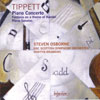Tippett Piano Concerto; Piano Sonatas
Concerto or sonata, Osborne equals the best in this Tippett triumph
View record and artist detailsRecord and Artist Details
Composer or Director: Michael Tippett
Label: Hyperion
Magazine Review Date: 12/2007
Media Format: CD or Download
Media Runtime: 0
Mastering:
Stereo
DDD
Catalogue Number: CDA67461/2

Tracks:
| Composition | Artist Credit |
|---|---|
| Concerto for Piano and Orchestra |
Michael Tippett, Composer
BBC Scottish Symphony Orchestra Martyn Brabbins, Conductor Michael Tippett, Composer Steven Osborne, Piano |
| Fantasia on a Theme of Handel |
Michael Tippett, Composer
BBC Scottish Symphony Orchestra Martyn Brabbins, Conductor Michael Tippett, Composer Steven Osborne, Piano |
| Sonata for Piano No. 1 |
Michael Tippett, Composer
Michael Tippett, Composer Steven Osborne, Piano |
| Sonata for Piano No. 2 |
Michael Tippett, Composer
Michael Tippett, Composer Steven Osborne, Piano |
| Sonata for Piano No. 4 |
Michael Tippett, Composer
Michael Tippett, Composer Steven Osborne, Piano |
| Sonata for Piano No. 3 |
Michael Tippett, Composer
Michael Tippett, Composer Steven Osborne, Piano |
Author: Arnold Whittall
The young Tippett – magpie and maverick – sought maximum intensity of feeling while shunning what he felt to be the sentimental fervour of Elgar, Bax and Walton. Equally abhorrent were the pastoral pieties of Vaughan Williams. Tippett took his stand with Blake and Yeats rather than Bunyan, and a Blake whose “bow of burning gold” required something altogether less complacent than Parry’s well upholstered jingoism.
The results are plain to hear in Tippett’s earliest works for piano, the First Sonata and the Handel Fantasia. The slow movement of the sonata may flirt briefly with Hindemith-style counterpoint but the predominant spirit is fiery and spontaneous, with a reinvigorated romanticism embracing those aspects of popular music which Tippett believed to have “classical” potential.
The road ahead was bumpy and he occasionally lost his way, as in the very long slow movement of the Third Sonata, aspiring to Beethovenian depth but bogged down in overly dense textures. There are also several repetitions too many in the Fourth Sonata, though the final movement’s gently poetic sense of resignation more than compensates.
Most powerful of all is the mighty Concerto, starkly and confidently poised between Tippett’s still richly potent earlier style and the brave new possibilities explored in its visionary central movement. This recording blends the piano in with the orchestra, acknowledging the work’s symphonic attributes, and there is a certain recessed quality to the sound of the piece throughout. Nevertheless, the eloquence and fantasy of what is undoubtedly one of the major works of the 1950s is superbly projected in a performance which need fear no comparison with the best earlier recordings, by John Ogdon (EMI, 12/91R) and Howard Shelley (Chandos, 4/95). As for the sonatas, Steven Osborne is at least the equal of Paul Crossley (CRD, 6/92) in interpretative empathy, and has the advantage of superlative modern recording. There’s a further advantage: perceptive and lucid booklet-notes by Ian Kemp, Tippett’s friend and biographer, and one of Osborne’s mentors. The set is dedicated to him.
The results are plain to hear in Tippett’s earliest works for piano, the First Sonata and the Handel Fantasia. The slow movement of the sonata may flirt briefly with Hindemith-style counterpoint but the predominant spirit is fiery and spontaneous, with a reinvigorated romanticism embracing those aspects of popular music which Tippett believed to have “classical” potential.
The road ahead was bumpy and he occasionally lost his way, as in the very long slow movement of the Third Sonata, aspiring to Beethovenian depth but bogged down in overly dense textures. There are also several repetitions too many in the Fourth Sonata, though the final movement’s gently poetic sense of resignation more than compensates.
Most powerful of all is the mighty Concerto, starkly and confidently poised between Tippett’s still richly potent earlier style and the brave new possibilities explored in its visionary central movement. This recording blends the piano in with the orchestra, acknowledging the work’s symphonic attributes, and there is a certain recessed quality to the sound of the piece throughout. Nevertheless, the eloquence and fantasy of what is undoubtedly one of the major works of the 1950s is superbly projected in a performance which need fear no comparison with the best earlier recordings, by John Ogdon (EMI, 12/91R) and Howard Shelley (Chandos, 4/95). As for the sonatas, Steven Osborne is at least the equal of Paul Crossley (CRD, 6/92) in interpretative empathy, and has the advantage of superlative modern recording. There’s a further advantage: perceptive and lucid booklet-notes by Ian Kemp, Tippett’s friend and biographer, and one of Osborne’s mentors. The set is dedicated to him.
Discover the world's largest classical music catalogue with Presto Music.

Gramophone Digital Club
- Digital Edition
- Digital Archive
- Reviews Database
- Full website access
From £8.75 / month
Subscribe
Gramophone Full Club
- Print Edition
- Digital Edition
- Digital Archive
- Reviews Database
- Full website access
From £11.00 / month
Subscribe
If you are a library, university or other organisation that would be interested in an institutional subscription to Gramophone please click here for further information.




